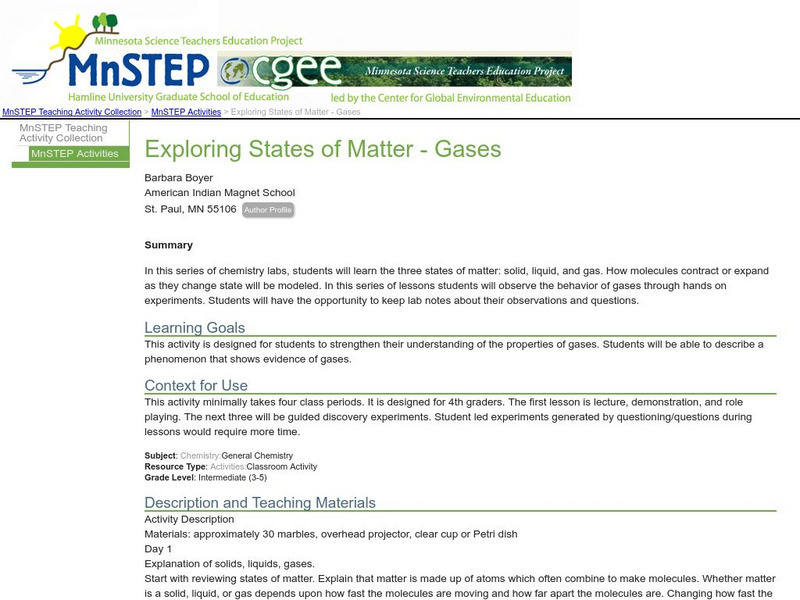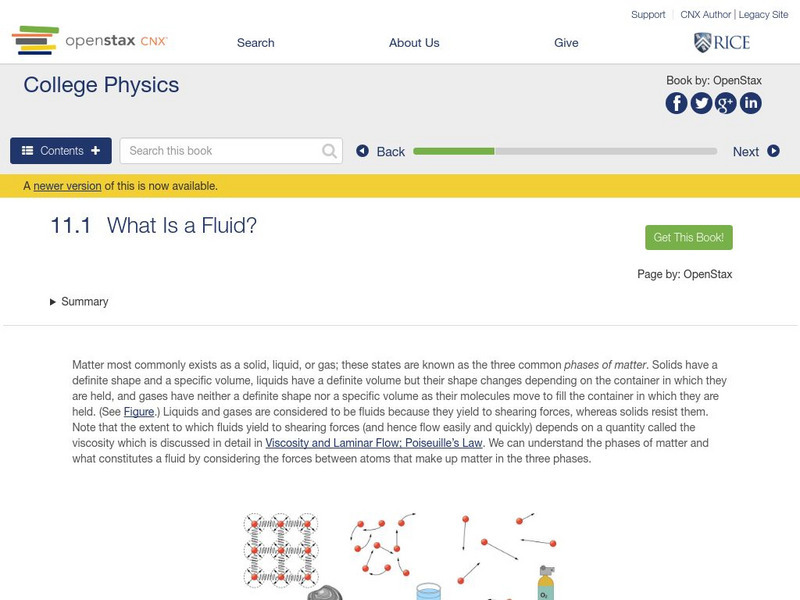Center for Literacy and Disability Studies, University of North Carolina at Chapel Hill
Tar Heel Reader: Three Kinds of Matter: Solids, Liquids, and Gases
Find out about the three states of matter: solids, liquids, and gases.
PBS
Pbs Learning Media: Phases of Matter: Interactive Lesson
Learn about the three phases of matter, and how the addition and removal of thermal energy (also known as heat) affects them.
Science Education Resource Center at Carleton College
Serc: Freezing and Phase Change: How Do You Make Ice Cream?
Young scholars will be expanding a study of phase changes after experiences with exploration of the three phases of matter. They apply what they have learned through freezing water and create a tasty ice cream treat.
University of Colorado
University of Colorado: Ph Et Interactive Simulations: States of Matter: Basics
After watching this simulation, students will be able to describe characteristics of the three states of matter. They will watch as atoms and molecules change between solid, liquid and gas phases.
Science Education Resource Center at Carleton College
Serc: Exploring States of Matter Gases
In this series of chemistry labs, students learn about the three states of matter by observing how molecules contract or expand as they change state.
Other
Science4 Us: Changes in Matter
Through an instructional video, games, and activities, students explore three types of change matter makes: physical change, in which only the shape of the matter changes; physical phase change in which matter changes to a different form...
American Chemical Society
Middle School Chemistry: Chapter 1: Solids, Liquids, and Gases
Five exemplary chemistry lessons about the three states of matter complete with handouts and animations.
OpenStax
Open Stax: What Is a Fluid?
From a chapter on Fluid Statics in a Physics textbook. This introductory section of the chapter covers the three common phases of matter, their physical properties, and how atoms are arranged in solids, liquids, and gases. Includes a...
CK-12 Foundation
Ck 12: Plix: Solid, Liquid and Gas
[Free Registration/Login Required] In this interactive you will move the red dot below each flask to observe how particles move in each different phase of water. You will need a sign-in to access this media, but it will be well worth...
Other
Science4us: States of Matter
In the States of Matter module, students further explore the concept that anything on earth that has mass and takes up space is matter. This exercise introduces students to solids, liquids and gases, the three most common states of...
National High Magnetic Field Laboratory
Magnet Academy: Carl Edwin Wieman
Carl Edwin Wieman is one of three physicists credited with the discovery of a fifth phase of matter, for which he was awarded a share of the prestigious Nobel Prize in 2001. The recognition capped a distinguished career that began deep...
Other
Science Alive: Melting Point Simulation
Percy Julian and Josef Pikl used the fact that melting point-the temperature at which a substance changes from a solid to a liquid-is a characteristic property of a substance to prove that the British chemist Robert Robinson could not...
Florida State University
Florida State University: Intermolecular Forces: Changes of State
Discusses the changes of state that can occur for the three different types of matter (solids, liquids, and gases) and different types of heat energy that have been defined by scientists.
New York University
New York University: States of Water
Use this resource to learn about the three different phases of water; solid, liquid, and gas. What happens to water as it changes into a solid or gas? Includes short and easy to do activity.
Other
Kinetic Molecular Theory [Pdf]
This PDF is fill in the blank notes, activities and graphic organizers on kinetic molecular theory.
University of Notre Dame
Und: Properties of a Pure Substance [Pdf]
Often we find that different phases of pure substances can exist in equilibrium with one another. Let us consider an important gedankenexperiment (Latin-German for "thought experiment") in which we boil water. Ordinary water boiling is...









